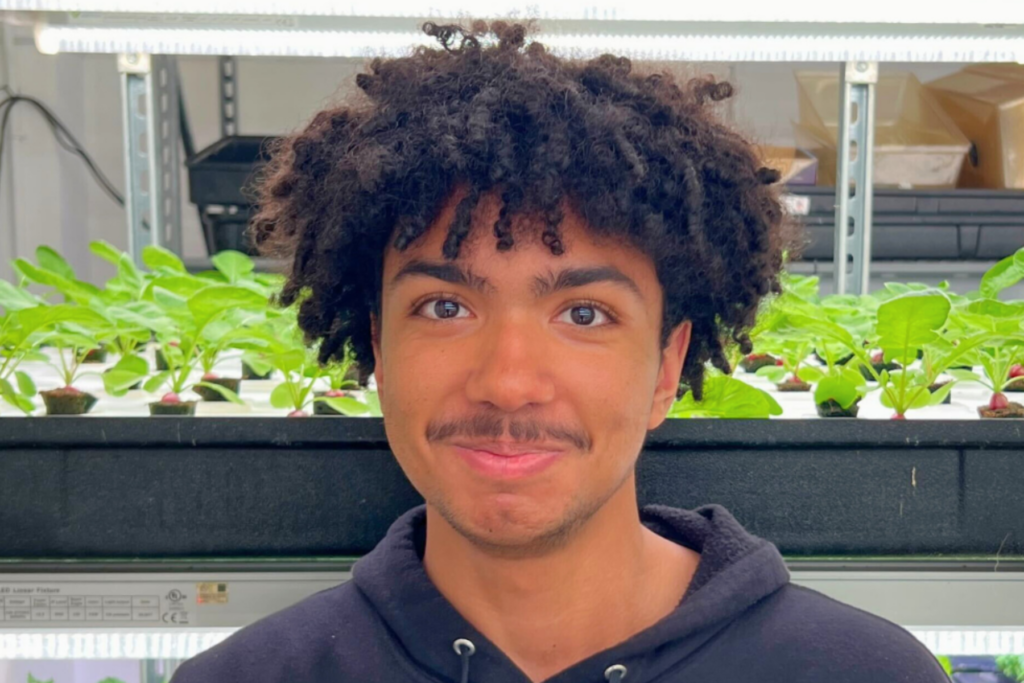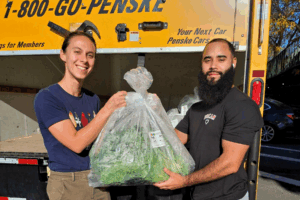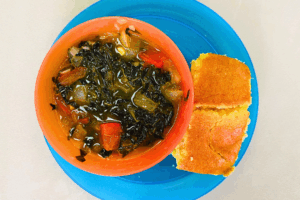By: Pamela Honey
Francisco Hernandez, a dedicated farm intern at DeWitt Clinton High School, plays an active role in the school’s hydroponic farm. He shares his experience working with sustainable farming methods, how it has changed his outlook on food production, and the innovative ways the farm has helped the local community.
Pamela Honey: Let’s start with a little warm-up. Can you tell me a bit about yourself and how you first got involved with Teens for Food Justice (TFFJ)?
Francisco Hernandez: Sure! My name is Francisco. I started working with the farm at TFFJ around 2023, but I got connected through Good Shepherd Services in 2022. I was part of the YBC program at DeWitt Clinton High School. I was having a tough time at my previous school, so I transferred over to finish my high school education and get ready for adult life.
Good Shepherd Services had this program called Learn to Work. They helped us build resumes, taught us how to act in interviews, and explained important things like sick leave and no-shows. When it came to work placements, they grouped us based on our experiences. Since I’m from the Dominican Republic and grew up on my grandma’s chicken farm, I chose to work on the farm here at TFFJ. It was all new to me because I didn’t know much about hydroponic farming, but it’s been fun learning about it.
Pamela: That’s great. What’s been the most rewarding part of learning about food justice and hydroponic farming through TFFJ?
Francisco: Hydroponic farming is really cool, especially the way it’s done here. They’ve got this tall, floodgate system that took me a bit of time to fully grasp. But what really stood out was being involved in the food justice aspect. This was my first time learning about it, and it felt good knowing I was helping distribute fresh food to community centers like KHCC (Kingsbridge Heights Community Center) and JASA (Jewish Association Serving the Aging). It’s not just growing plants – it’s about helping low-income communities have access to fresh, nutritious food.
It’s not just growing plants – it’s about helping low-income communities have access to fresh, nutritious food.
I love that I can see the whole process, from planting to harvest, and know that the food we grow is going to people who need it. Plus, when I take some of the produce home, it’s so fresh and delicious. That’s fulfilling.
Pamela: It sure is! How has working on the hydroponic farm changed the way you think about growing food and food access?
Francisco: It really changed my perspective. The idea that farming can happen indoors was mind-blowing to me. I used to think farming could only happen outside with soil and bugs. In outdoor farms, especially in the summer, you’re always dealing with bugs, but here, there are so many ways to manage them and prevent them from becoming an issue. But now I know that hydroponic farming is just as effective, if not more in certain situations. You can even have small systems at home to grow fresh food, like the eggplant system we have here.
Pamela: What does food justice mean to you, and how do you feel TFFJ is making a difference?
Francisco: Food justice is really important to me, especially because I’ve lived in the Bronx for most of my life. Growing up, access to fresh food wasn’t always easy. Farmer’s markets weren’t always an option, and while supermarkets had produce, it wasn’t the same. The taste and variety are different. TFFJ is making a huge difference by providing fresh food to communities that don’t have easy access to it.
TFFJ is making a huge difference by providing fresh food to communities that don’t have easy access to it.
It’s amazing to think that I’m part of that change. People in my neighborhood, like my neighbors who pick up food from KHCC, are eating produce I helped grow. It’s eye-opening for them too, knowing that fresh food is grown locally in the Bronx, and it’s making a real impact.
Pamela: How do you think your experience with TFFJ will impact your future goals, both academically and personally?
Francisco: It’s definitely opened my mind. Before this, I had a one-sided view of farming, but now I see that there are so many different ways to do it. It’s taught me to keep an open mind, not just in farming, but in life in general. I’ve even thought about studying agriculture, but I’m still figuring out if that’s the path I want to take.
Pamela: In what ways have you been able to share what you’ve learned with your family, friends, or community?
Francisco: My family has a farming background, but they were really surprised when I told them about hydroponic farming. When I visited the Dominican Republic last summer, I showed them pictures and explained how it works. They were amazed. Even my neighbor here in the Bronx was impressed when I told him that the food he was eating from KHCC might have been grown by me.
I’ve even grown some stuff at home. Last year, I grew a small jalapeño pepper plant using a little jar system they gave us at school. It’s still alive, and I’m still using the peppers!
Pamela: What has surprised you the most about working with hydroponic farming and advocating for food justice?
Francisco: What surprised me most about hydroponic farming was how automated everything is. I thought I’d have to manually add nutrients or water the plants, but it’s all done with pumps and computers. I was asking a lot of questions at first because it was so new to me, but now I understand the whole system, from how the water circulates to how the nutrient dosing works.
Advocating for food justice has been eye-opening too. We went to a meeting where people talked about food justice from different angles, including the legal side. It was amazing to see how many people are working toward the same goal of making fresh food accessible to everyone.
Pamela: Why do you think programs like TFFJ are important for schools and communities?
Francisco: These programs are important because they impact so many people, especially in schools. Students can come into the farm, get hands-on experience, and take home the food they’ve grown. It’s not just a learning opportunity for them – it’s a way to spread awareness about food justice.
Pamela: If you could encourage other students to join TFFJ programs, what would you say to them?
Francisco: I’d tell them that it’s a great way to learn about food justice and get involved in something bigger than themselves. I’d probably give them a sample of the produce we grow to show them that it’s real, fresh food. They can see it, taste it, and know that they’ve helped grow it.
And it’s not just about growing food – it’s about learning new things. They’ll get to work with plants they’re familiar with, like cilantro and lettuce, and also try new things like pak choy and chard. It’s a hands-on experience that can really change the way they think about food and health. ❦
Pamela Honey is the Communications & Content Coordinator at Teens For Food Justice.





